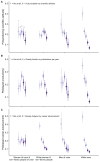Unprofessional peer reviews disproportionately harm underrepresented groups in STEM
- PMID: 31844596
- PMCID: PMC6911688
- DOI: 10.7717/peerj.8247
Unprofessional peer reviews disproportionately harm underrepresented groups in STEM
Abstract
Background: Peer reviewed research is paramount to the advancement of science. Ideally, the peer review process is an unbiased, fair assessment of the scientific merit and credibility of a study; however, well-documented biases arise in all methods of peer review. Systemic biases have been shown to directly impact the outcomes of peer review, yet little is known about the downstream impacts of unprofessional reviewer comments that are shared with authors.
Methods: In an anonymous survey of international participants in science, technology, engineering, and mathematics (STEM) fields, we investigated the pervasiveness and author perceptions of long-term implications of receiving of unprofessional comments. Specifically, we assessed authors' perceptions of scientific aptitude, productivity, and career trajectory after receiving an unprofessional peer review.
Results: We show that survey respondents across four intersecting categories of gender and race/ethnicity received unprofessional peer review comments equally. However, traditionally underrepresented groups in STEM fields were most likely to perceive negative impacts on scientific aptitude, productivity, and career advancement after receiving an unprofessional peer review.
Discussion: Studies show that a negative perception of aptitude leads to lowered self-confidence, short-term disruptions in success and productivity and delays in career advancement. Therefore, our results indicate that unprofessional reviews likely have and will continue to perpetuate the gap in STEM fields for traditionally underrepresented groups in the sciences.
Keywords: Intersectionality; Peer review; STEM; Underrepresented minorities.
© 2019 Silbiger and Stubler.
Conflict of interest statement
The authors declare that they have no competing interests.
Figures



References
-
- Alfred MV, Ray SM, Johnson MA. Advancing women of color in STEM: an imperative for U.S. global competitiveness. Advances in Developing Human Resources. 2019;21(1):114–132. doi: 10.1177/1523422318814551. - DOI
-
- Baumeister RF, Campbell JD, Krueger JI, Vohs KD. Does high self-esteem cause better performance, interpersonal success, happiness, or healthier lifestyles? Psychological science in the public interest. A Journal of the American Psychological Society. 2003;4(1):1–44. - PubMed
-
- Bird KS. Do women publish fewer journal articles than men? Sex differences in publication productivity in the social sciences. British Journal of Sociology of Education. 2011;32(6):921–937. doi: 10.1080/01425692.2011.596387. - DOI
LinkOut - more resources
Full Text Sources
Miscellaneous

